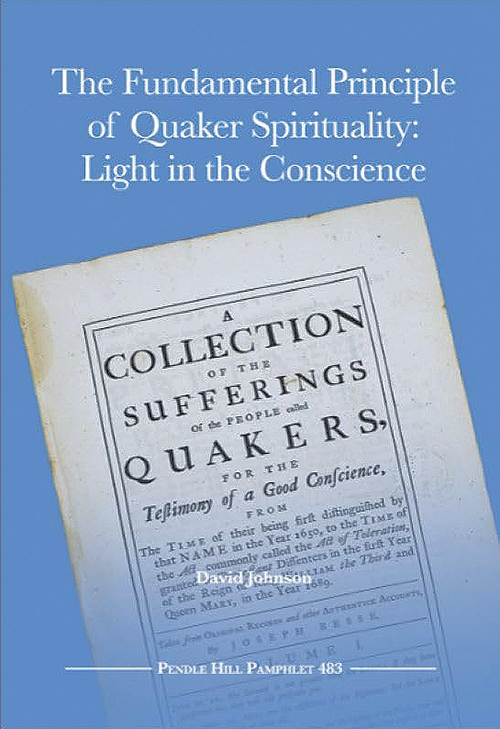
The Fundamental Principle of Quaker Spirituality: Light in the Conscience
Reviewed by Patricia McBee
March 1, 2024
By David Johnson. Pendle Hill Pamphlets (number 483), 2023. 35 pages. $7.50/pamphlet or eBook.
Motivated by the question, “Where did the early Quakers, who turned the world upside down, find the life and power to do the things they did?” David Johnson undertook to read the very early documents where those first Friends described their foundational experiences. This pamphlet is replete with brief quotations from early Friends and citations of biblical passages that illustrate the energizing principles that Johnson discovered: the Inward Light and conscience. As I read along, however, I saw that “Light” and “conscience” are only a starting point on a more rigorous journey.
Early Christians and Early Friends affirm that each of us, every human, is anointed or endowed with the Inward Light.
- “The true light that enlightens every man . . .” —John 1:9
- “God . . . pours out of his spirit upon all men and women in the world (Joel 2:28) . . . whites and blacks, Moors, and Turks, Indians, Christians, Jews, and Gentiles. —George Fox
- “God, through Christ, hath placed a principle in every man, to inform him of his duty, and to enable him to do it.” —William Penn
Johnson goes on to cite the role of “conscience” in early Quaker and biblical passages.
- “YHWH, you’ve searched me, and you know me. . . . Whether I walk or lie down, you are watching; you are intimate with all my ways.” —Ps. 139:1–4
- “That of God in thy conscience will tell thee.” —George Fox
- “[I was moved] to declare to souls where their Teacher is, the Light in their consciences.” —William Dewsbury
- “[E]very one must love the light of Christ in his own conscience, and become a follower of it.” —Edward Burrough
These early writings affirm that everyone has this capacity; everyone is anointed by an Inward Light and endowed with a conscience that is illuminated by that Light. But we know that not everyone lives a life of compassion, integrity, and faithfulness. As Johnson notes, “All people have the Inward Light, but some just do not notice it.” We need an operating manual for how to access that Light and to empower it to guide us.
While Johnson’s pamphlet is mainly focused on the Light in the conscience, he weaves in some basic elements of the operating manual. “The first Friends discovered that waiting in silence, allowing all thoughts and imaginations to pass by without comment, gradually opened up an inner world where the Spirit of God communicated directly to them, by immediate and continuing revelation.” “The early Friends relied on a daily ‘retirement’ so they could keep their inward eye stayed upon God, for being attentive to God takes practice.” It requires “careful inward listening and attentiveness to the Inward Light, so we are not derailed by our ego and worldly thoughts.”
A more contemporary caution regarding “worldly thoughts” would be to take care to avoid harmful behaviors that are approved and even encouraged by the dominant culture, such as taking advantage of others financially for our own gain, using violence to expand access to resources, justifying actions with the belief that another group of people is inferior, or disregarding the impact of our behavior on the world’s climate.
Johnson wraps up his pamphlet with these questions: “What if it is this simple? What if God is there in every moment, waiting for our awareness, attentiveness, acceptance, and yielding, to enter the Way of peace and joy and compassion, with courage, without fear or anxiety or self-centeredness? What if it is that simple?”
It may be simple in concept. It doesn’t require complex theological arguments, dogma, or intermediaries to follow the Light in the conscience. I would submit, however, that it requires an additional, rigorous ingredient, one that Friends often resist, fearing that they would be giving up autonomy. That ingredient is “submission”: making a commitment to pay attention to one’s conscience, to listen to its promptings, test what the promptings mean for the choice before us, and not allow ourselves to be distracted by excuses and self-justification.
David Johnson shows us the basic building blocks as seen by early Christians and early Friends. It requires intention and discipline to allow ourselves to be guided by that Light.
Patricia McBee is a Quaker writer and teacher. She is a member of Newtown (Pa.) Meeting.



Comments on Friendsjournal.org may be used in the Forum of the print magazine and may be edited for length and clarity.